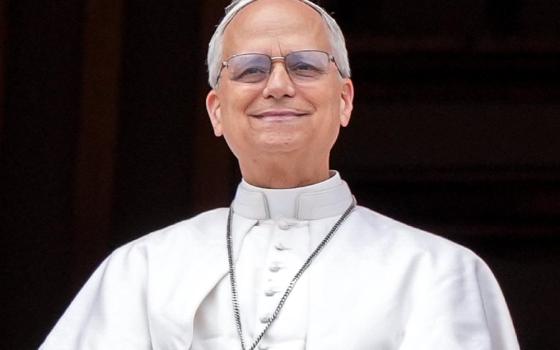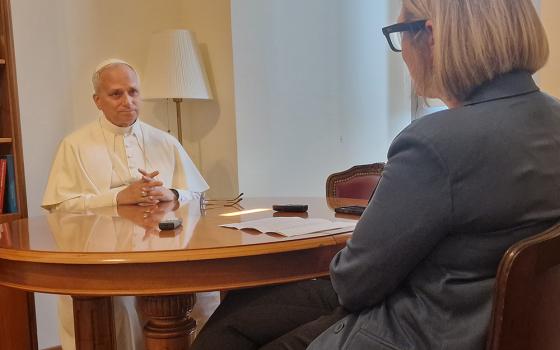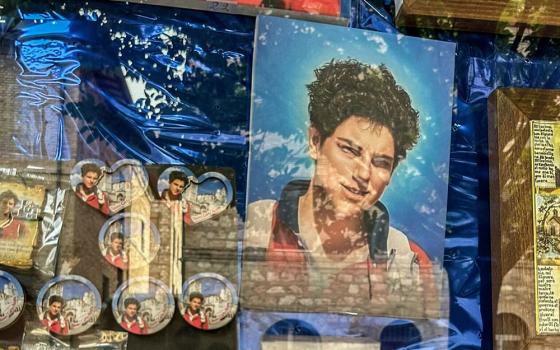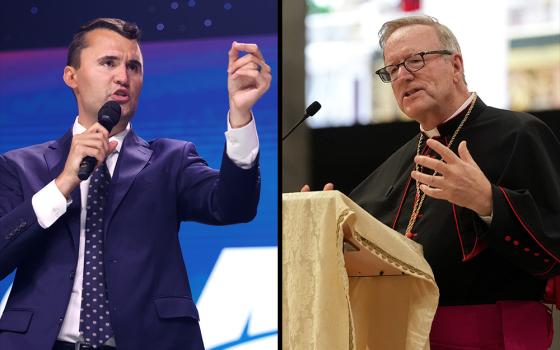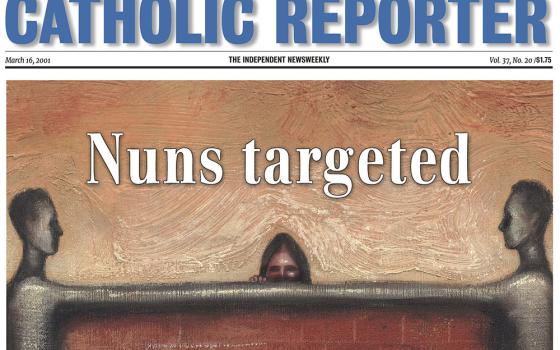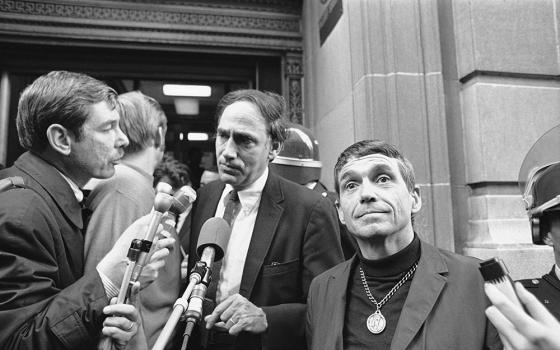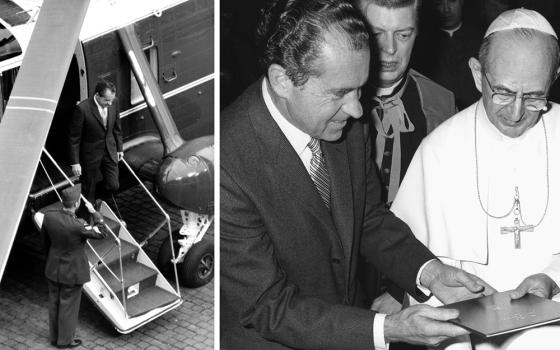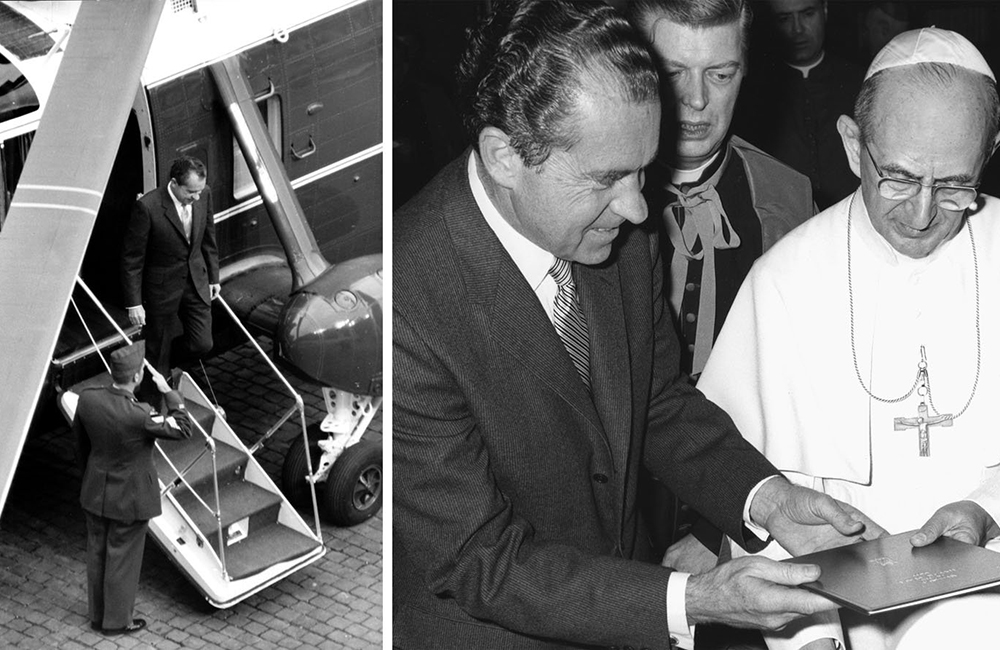
When then-President Richard Nixon met with Pope Paul VI in 1970, he arrived by helicopter, landing and taking off from St. Peter's Square. In August of 1972, Nixon campaigned hard for the Catholic vote, and NCR covered it from its then-newly opened Washington bureau. (CNS file photos)
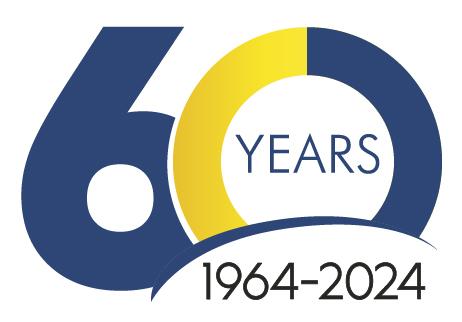
(NCR logo/Toni-Ann Ortiz)
History doesn't repeat itself, the adage goes, but it often rhymes. We've learned that this year as we explore coverage in National Catholic Reporter over the past six decades.
In August of 1972, President Richard Nixon campaigned hard for the Catholic vote, and NCR covered it from its then-newly opened Washington bureau. It goes to show that politicians have kept in mind the Catholic vote for decades.
This year, NCR has written about Bishop Robert Barron of the Diocese of Winona-Rochester, Minnesota, because of his appearances at events with President Donald Trump.
NCR correspondent Rick Casey interviewed Patrick Buchanan, then an aide to Nixon and later a presidential candidate himself, about the Catholic vote. A prominent conservative Catholic, Buchanan was the political aide helping Nixon develop an appeal to Catholics. Outreach to U.S. prelates, such as Philadelphia's John Krol, was key to Nixon's reelection campaign and predicted he would win the Catholic vote after decades of affiliation with the Democratic Party.
The story was prescient. As Robert Jones of the Public Religion Research Institute told NPR, Nixon's 1972 election was a turning point with fewer Catholics voting Democrat than in previous elections.
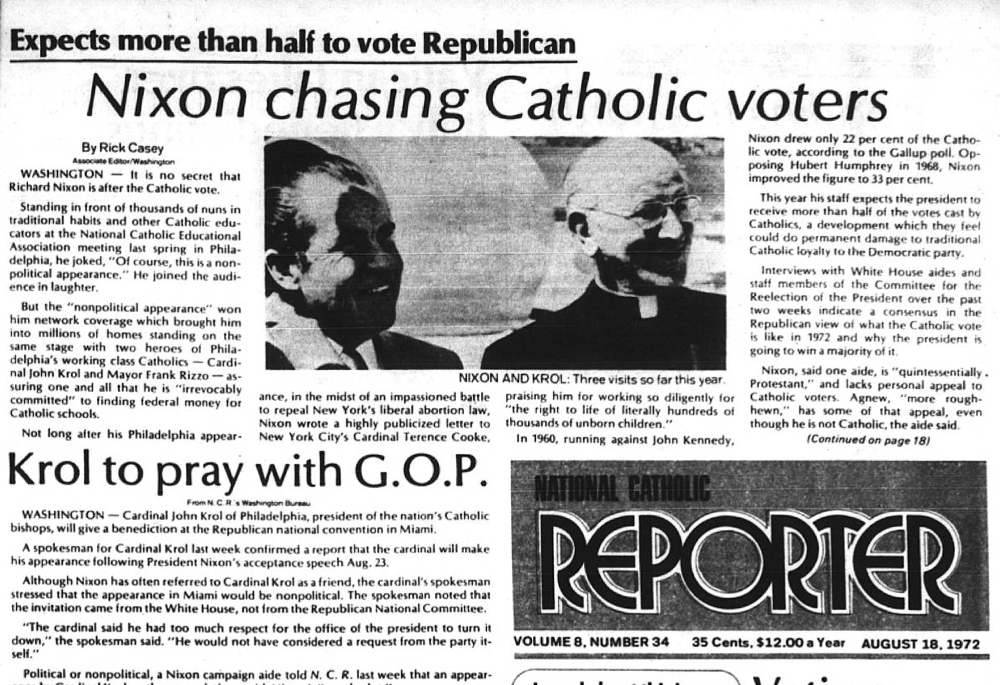
The Aug. 18, 1972, issue of National Catholic Reporter includes an article by Rick Casey on then-President Richard Nixon and his campaign for Catholic voters. (NCR photo)
Nixon chasing Catholic voters
Expects more than half to vote Republican
Aug. 18, 1972
By Rick Casey
Associate Editor/Washington
WASHINGTON — It is no secret that Richard Nixon is after the Catholic vote.
Standing in front of thousands of nuns in traditional habits and other Catholic educators at the National Catholic Educational Association meeting last spring in Philadelphia, he joked, "Of course, this is a nonpolitical appearance." He joined the audience in laughter.
But the "nonpolitical appearance" won him network coverage which brought him into millions of homes standing on the same stage with two heroes of Philadelphia's working-class Catholics — Cardinal John Krol and Mayor Frank Rizzo — assuring one and all that he is "irrevocably committed" to finding federal money for Catholic schools.
Not long after his Philadelphia appearance, in the midst of an impassioned battle to repeal New York's liberal abortion law, Nixon wrote a highly publicized letter to New York City's Cardinal Terence Cooke, praising him for working so diligently for "the right to life of literally hundreds of thousands of unborn children."
In 1960, running against John Kennedy, Nixon drew only 22 per cent of the Catholic vote, according to the Gallup poll. Opposing Hubert Humphrey in 1968, Nixon improved the figure to 33 per cent.
This year his staff expects the president to receive more than half of the votes cast by Catholics, a development which they feel could do permanent damage to traditional Catholic loyalty to the Democratic party.
Interviews with White House aides and staff members of the Committee for the Reelection of the President over the past two weeks indicate a consensus in the Republican view of what the Catholic vote is like in 1972 and why the president is going to win a majority of it.
Nixon, said one aide, is "quintessentially Protestant," and lacks personal appeal to Catholic voters. Agnew, "more roughhewn," has some of that appeal, even though he is not Catholic, the aide said.
A prime example of a man who has the appeal, the aide said, is Mayor Rizzo. "He's ethnic, Catholic and relates to that community." (Remember that joint appearance in Philadelphia at which time Nixon heaped praise on Rizzo, and note that Rizzo, a former police chief, has since become a Democrat for Nixon.)
Another aide, however, described Nixon as a person who "appeals to traditional Catholics as a solid citizen, a family man with clean-cut, active kids."
But all those interviewed agreed that on the issues, Nixon is intimately aligned with traditional Catholic values.
"The basis of the president's support is his parallel values and concerns with middle and low-income Catholics," said Patrick Buchanan, White House aide who together with Henry Cashen specializes in Catholic issues.
Buchanan, former editorial writer for the conservative St. Louis Globe-Democrat, Cashen, a lawyer from Detroit, and others interviewed painted this composite picture of the Catholic voter who will go Republican this year:
In addition to the obviously Catholic issues of nonpublic school aid and abortion, the Catholic voter is concerned about threats to his family such as pornography and drugs, and threats to his neighborhood like crime and busing.
He is also seen as being intensely patriotic, and relatively hawkish on the war in Indochina. Nixon, contends his staff, comes off considerably stronger on all these issues than does McGovern.
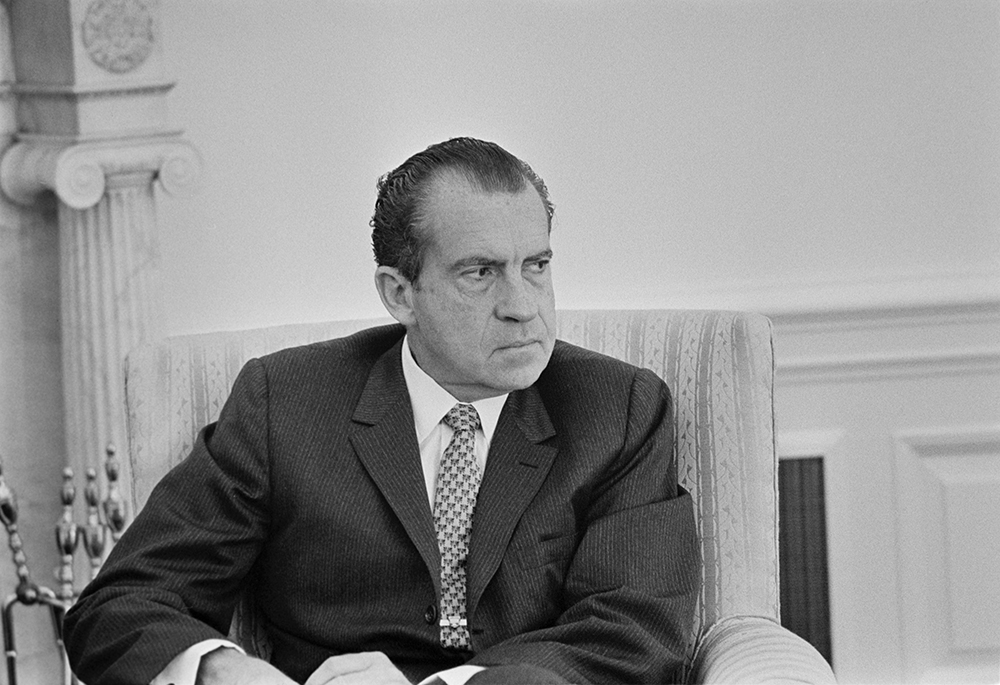
Then-President Richard Nixon is pictured Nov. 15, 1969, the day of the mass mobilization march and rally protesting the war in Vietnam in Washington. (OSV News/Courtesy of Richard Nixon Presidential Library and Museum)
Cashen, whose two secretaries have their own copies of the Kenedy Official Catholic Directory, said Nixon often seeks Catholic opinion on a variety of issues.
Asked who the Catholics are that Nixon consults, Cashen mentioned Father Albert Koob, president of the National Catholic Educational Association, Bishop Joseph Bernardin, general secretary of the U.S. Catholic Conference, and Cardinal Krol, "who has been in to see the president three times this year."
"He is also very friendly with Cardinal Cooke and Cardinal (John) Cody (of Chicago) and corresponds regularly with Cardinal (Patrick) O'Boyle (of Washington)," said Cashen.
While Nixon may draw a lot of Catholic support based on the issues, Buchanan credits McGovern for pushing Catholics out of the Democratic column. He accuses McGovern of "equivocating" on the issues of abortion and school aid, of being the "foremost proponent of busing in the Senate," and of being soft on defense and crime.
"The McGovernites seem more concerned with exotic issues," said Buchanan. "One thing is for sure, boycotting lettuce is not where it's at."
Citing the Democratic convention, he added, "Who are the big losers when you set quotas for Indians, blacks and women? Well, I'll tell you, a lot of them are ethnic Catholic regulars."
Citing McGovern's replacement of Lawrence O'Brien as national party chairman and his troubles with Mayor Richard Daley of Chicago and President George Meaney of the AFL-CIO, Buchanan said it was symbolic: All three are Irish Catholics.
Buchanan believes that about two-thirds of the nation's Catholics share the traditional values he identifies with Nixon. He notes that a large enough electorate is involved that even a few percentage points could make a significant difference. In 1968, about 15 million Catholics went to the polls.
The Republicans no longer think of Catholics as such as a block vote. They feel the significant factor is that Democrats won't be able to count on such a block.
Advertisement
At the offices of the Committee for the Reelection of the President, two blocks away from the White House, Tony McDonald, one of several staffers assigned to work with various voting blocks, said Catholics cannot be compared as a block to Jews, for example, who have the overriding issue of Israel to pull them together.
"As Catholics, what issues do we have that we all agree on?" he asked. "Even priests disagree among themselves."
So McDonald's lists of blocks includes Jews, labor, young people, old veterans, but not Catholics.
Tario Szmagali, another staffer at the committee, however, deals with a block known as ethnics, and he admits that the majority of these are Catholics. Szmagali said efforts to reach the ethnic vote will include direct organizing and use of ethnic and Catholic press.
The importance of this section of the electorate can be seen by looking at the 10 states Szmagali is concentrating on: New York, New Jersey, Maryland, Connecticut, Pennsylvania, Ohio, Illinois, Michigan, California and Missouri.
Szmagali sees the ethnic vote as being the swing vote in all of these crucial states except California where ethnics, mainly Italians, are not as concentrated as elsewhere, and New York where the Jewish vote is also seen as critical.
Szmagali described the 15 to 20 million ethnics in these 10 states as being interested in largely the same issues described earlier. In addition to nonpublic school aid and abortion, Szmagali placed emphasis on the war.
"Most of these people side with the president on this," he said. "They don't really understand how we're going to beg for our prisoners. That is a remark McGovern is really going to regret."
He referred to a McGovern statement that he would go to Hanoi and beg for the release of prisoners of war if necessary, since "begging is better than bombing."
In 1969, then administration aide Kevin Phillips wrote a book which became very fashionable in Washington. Titled The Emerging Republican Majority, it outlined a strategy for a new coalition of Republicans, Wallaceites and Catholics. When Phillips left the administration in the spring of 1970, he was convinced that Nixon, foolishly, was ignoring his plan. As he wrote last week in the New York Times:
"By summer, 1970, the administration was leaning in the liberal direction, and jeopardizing its political realignment with such schemes as busing, removal of tax exemption for some Southern schools, George Romney's suburban low-income housing quotas, the Philadelphia Plan and, of course, the Family Assistance (guaranteed annual income) Plan. Meanwhile, parochial school aid and help for farmers were ignored."
But, as Phillips points out, the administration has since proposed legislation limiting busing, has slowed down attempts for government induced integration in housing and employment, and has lain low on the Family Assistance Plan.
The administration has also endorsed a specific legislative proposal now in the Flouse to provide tax credit relief for parents of nonpublic school children.
As a result, Phillips now predicts that "ethnic and labor support will help Nixon in Pennsylvania and New Jersey (especially in Pennsylvania, where Democratic majorities in Philadelphia will plummet because of the pro-Nixon activities of Democratic Mayor Frank Rizzo and Roman Catholic Cardinal Krol). New York and Connecticut will be close, but I think the big shift in the Catholic vote will give Nixon a good chance of victory."

